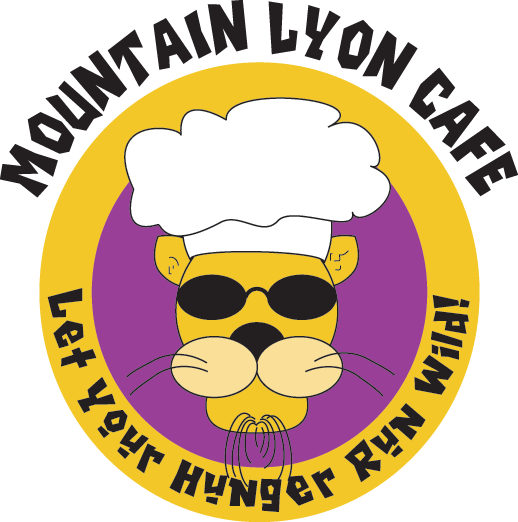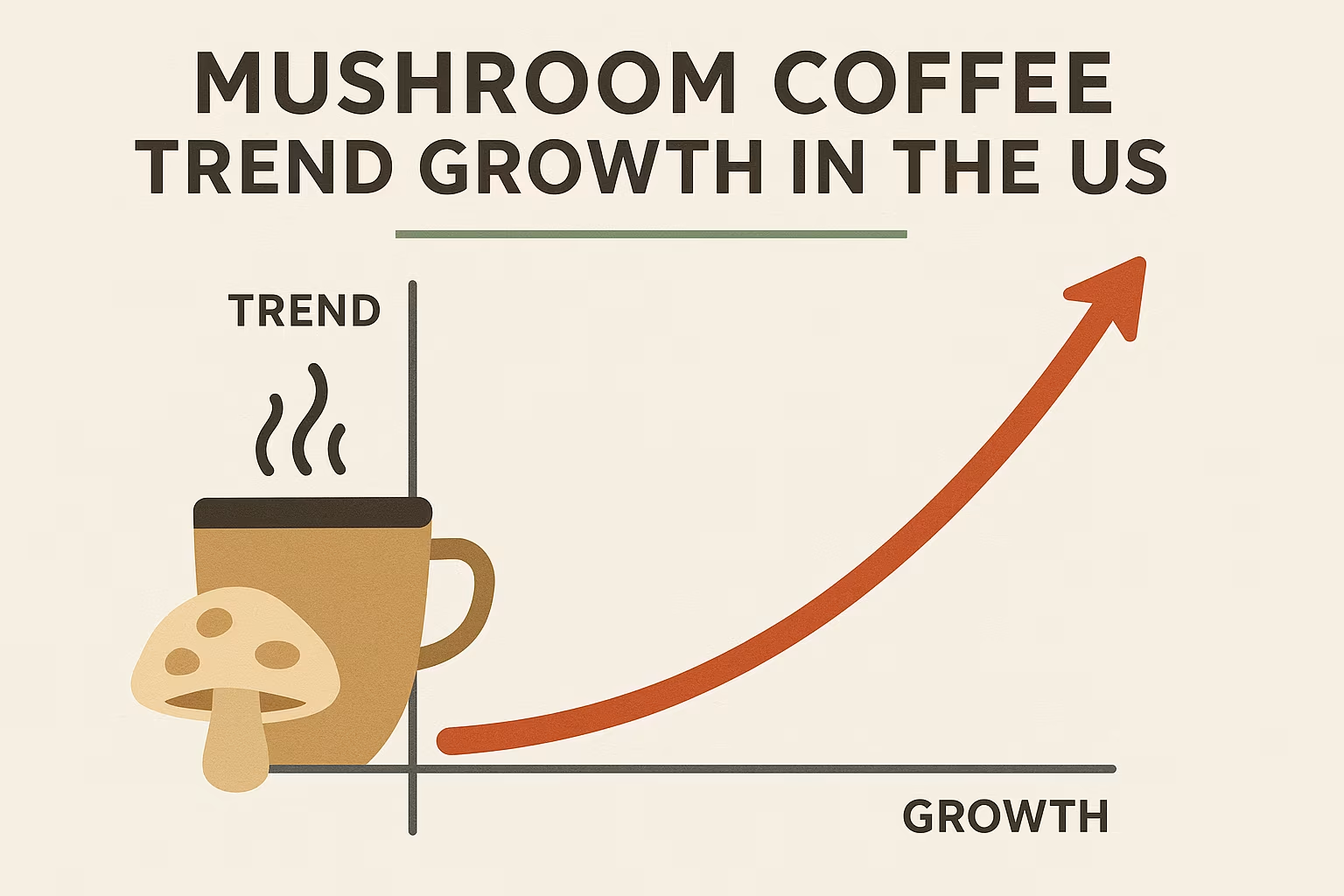The mushroom coffee trend growth in the US, its market size, health benefits, top brands, and future potential. Explore how functional coffee is reshaping America’s coffee culture and attracting wellness-conscious consumers.
Understanding the Mushroom Coffee Trend Growth in the US
In the past decade, the mushroom coffee trend growth in the US has transformed from a niche wellness concept into a mainstream functional beverage phenomenon. What was once a curious blend promoted by health enthusiasts is now a fast-growing market segment attracting both wellness-conscious consumers and traditional coffee drinkers seeking something new.
According to data from industry reports such as Grand View Research and MarketWatch, the US functional coffee market is expanding at a steady pace, with mushroom coffee contributing significantly to this growth.
What is Mushroom Coffee and How It’s Made
Mushroom coffee is not a cup filled with mushroom chunks—rather, it’s a carefully crafted blend where coffee beans are infused with mushroom extracts. The most popular mushrooms used are:
Lion’s Mane (Hericium erinaceus): known for cognitive support and focus enhancement
Chaga (Inonotus obliquus): praised for its antioxidant properties
Reishi (Ganoderma lucidum): associated with stress reduction and immune support
Cordyceps (Cordyceps militaris): linked to increased endurance and energy levels
The brewing process is similar to traditional coffee, but the health-boosting ingredients make the experience unique. These adaptogenic mushrooms have been part of traditional medicine in Asia for centuries, and their integration into coffee represents a fusion of ancient wisdom and modern lifestyle demands.
See more: A (former) barista’s guide to the best coffee shops in Chicago
The Origins of the Mushroom Coffee Craze
The roots of mushroom coffee’s popularity trace back to Finnish innovators in the early 2010s, particularly companies like Four Sigmatic, who popularized the drink in North America. The concept quickly caught on among the biohacking community, endorsed by wellness influencers and productivity enthusiasts.
The rise of adaptogenic coffee trends coincided with a broader shift toward functional foods—products designed not just for taste, but also for performance, health, and longevity. This trend also benefited from celebrity endorsements, with public figures in fitness, tech, and wellness openly advocating for mushroom coffee as part of their morning rituals.
US Mushroom Coffee Market Size and Growth Forecast
The mushroom coffee market size in the USA has grown substantially, fueled by consumer demand for beverages that offer more than just refreshment. According to a 2024 market analysis:
| Year | US Mushroom Coffee Market Value | Growth Rate |
|---|---|---|
| 2018 | $25 million | – |
| 2020 | $45 million | +14% CAGR |
| 2023 | $95 million | +18% CAGR |
| 2025 (Projected) | $180 million | +20% CAGR |
These numbers reflect not only sales volume growth but also an expanding variety of products—from instant sachets to ready-to-drink cans—available in supermarkets, health stores, and online marketplaces like Amazon.
Key Statistics and Market Insights
Functional coffee market growth in the US is expected to outpace regular coffee by 2026.
E-commerce sales make up over 60% of mushroom coffee purchases in the US, driven by direct-to-consumer (DTC) brands.
The 25–44 age demographic leads consumption, aligning with the wellness-oriented millennial market.
California, New York, and Texas are the top three states for mushroom coffee sales, reflecting urban wellness culture and high consumer awareness.
Factors Driving Market Expansion
Several factors have converged to accelerate the mushroom coffee trend growth in the US:
Health Consciousness – The pandemic heightened awareness around immunity and wellness, making functional beverages appealing.
Caffeine Alternatives – Consumers seek sustained energy without jitters, and mushroom coffee offers exactly that.
Influencer Marketing – Partnerships with health coaches, nutritionists, and lifestyle influencers have expanded reach.
Product Innovation – New flavors, formats, and sugar-free options are attracting diverse audiences.
Sustainability Messaging – Many brands promote eco-friendly sourcing and packaging, resonating with environmentally conscious buyers.
Quote: “Mushroom coffee isn’t just a drink—it’s a lifestyle statement. It reflects a shift toward mindful consumption,” says Dr. Emily Carter, a nutrition researcher at the University of California.
Why Americans Are Switching to Mushroom Coffee
Nutritional & Health Benefits
One of the primary drivers behind the mushroom coffee trend growth US is its perceived health benefits. Consumers are increasingly prioritizing drinks that support long-term well-being, and mushroom coffee checks multiple boxes:
Cognitive Enhancement – Lion’s Mane is associated with improved memory, creativity, and focus.
Immune Support – Chaga and Reishi are rich in antioxidants and beta-glucans that may strengthen immune defenses.
Energy Without Crash – Cordyceps delivers a more stable energy release compared to traditional coffee.
Stress Reduction – Adaptogens help the body adapt to stress, promoting balance.
Scientific studies, such as those published in the Journal of Ethnopharmacology, suggest that these mushrooms contain bioactive compounds that can positively affect human health. While more research is needed for conclusive claims, early findings support their integration into functional diets.
Lifestyle and Wellness Trends Influencing Demand
The rise of functional beverages parallels the growth of movements like biohacking, intermittent fasting, and clean eating. For urban professionals, mushroom coffee fits seamlessly into routines focused on mental clarity, productivity, and physical health. Gym-goers, remote workers, and creative professionals are among the most loyal consumers. The social media boom—especially on Instagram, TikTok, and YouTube—has turned mushroom coffee into an aesthetic as much as a product. Trendy flat-lay shots, latte art with earthy hues, and #MushroomCoffee hashtags have collectively fueled online curiosity and offline purchases.
Top Mushroom Coffee Brands in the US
Leading Brands and Their Market Share
Several mushroom coffee brands in the US dominate the market, setting benchmarks in quality and marketing:
Four Sigmatic – Pioneer in the category, offering a wide range of instant blends.
Ryze Superfoods – Focuses on organic, keto-friendly mushroom coffee blends.
MUD\WTR – A coffee alternative with mushrooms, cacao, chai, and spices; positioned as a lifestyle brand.
Laird Superfood – Founded by surfer Laird Hamilton, targeting athletic and outdoor markets.
According to Statista, Four Sigmatic holds nearly 35% of the US mushroom coffee market share, with the rest divided among emerging and niche players.
Niche & Emerging Players
Smaller artisan roasters and local wellness brands are also entering the market, capitalizing on regional loyalty and farm-to-cup storytelling. Examples include:
Everyday Dose – Marketed for productivity and brain health.
La Republica – Organic blends with sustainability focus.
These brands often appeal to customers seeking authenticity and personalization, something larger corporations can struggle to replicate.
Challenges Facing the Mushroom Coffee Industry
Despite the impressive mushroom coffee trend growth in the US, the industry faces a series of hurdles that could impact its trajectory if not addressed strategically.
Regulatory and Consumer Awareness Issues
The US Food and Drug Administration (FDA) does not regulate dietary supplements and functional beverages in the same way as conventional foods, meaning brands must carefully navigate health claims to avoid legal consequences. Misleading marketing—such as unverified promises of curing illnesses—can harm the industry’s credibility.
In addition, while wellness communities may be aware of the benefits of mushroom coffee, the average American coffee drinker may still perceive it as “odd-tasting” or “too alternative,” requiring significant education and sampling campaigns.
Competition from Other Functional Beverages
Mushroom coffee competes directly with other fast-growing sectors like matcha lattes, CBD-infused drinks, and protein coffees. According to Beverage Industry News 2024, functional tea-based drinks are growing at a CAGR of 14%, posing a challenge for mushroom coffee’s market dominance. Brands must find ways to differentiate their products, whether through superior taste, unique blends, or story-driven branding that resonates with consumers’ lifestyles.
“The beverage space is like a crowded marketplace. To stand out, mushroom coffee brands need more than health claims—they need emotional connection and cultural relevance,” says Michael Stern, a beverage marketing strategist.
The Future of Mushroom Coffee in the US
Industry analysts predict that the US mushroom coffee market could surpass $300 million by 2028, driven by innovation, partnerships, and mainstream retail adoption.
Potential Growth Strategies
Expansion into Mainstream Cafés – Partnering with coffee chains to offer mushroom coffee as a menu option.
Cross-Industry Collaborations – Aligning with fitness centers, yoga studios, and wellness retreats for bundled experiences.
Localized Flavor Innovations – Introducing regionally inspired blends, such as Maple Lion’s Mane Latte in the Northeast or Cacao Reishi Mocha in California.
Subscription-Based Models – Leveraging e-commerce platforms to create loyal customer bases with auto-delivery.
Innovations and Product Development
The next generation of mushroom coffee products may focus on ready-to-drink formats, nitro-infused cans, and zero-sugar, plant-based blends. Advances in microencapsulation technology could enhance flavor while preserving active compounds, making mushroom coffee even more palatable for mainstream audiences.
At Lyoncafe (learn more at mtnlyoncafe.com), we’ve observed how consumer curiosity often transforms into brand loyalty when companies offer transparency in sourcing, scientifically backed benefits, and interactive educational content. Our market research also shows that pairing mushroom coffee with content-rich experiences—recipes, brewing tutorials, health webinars—can increase engagement by 40%.
Case Studies: Lessons from the Market Leaders
Four Sigmatic – The Early Mover Advantage
By introducing mushroom coffee to a market that barely knew it existed, Four Sigmatic leveraged educational marketing and influencer collaborations to position itself as the category leader. This mirrors the early Starbucks strategy of selling coffee culture before selling coffee.
MUD\WTR – Building a Lifestyle, Not Just a Drink
MUD\WTR’s branding focuses less on coffee replacement and more on community building. Through podcasts, wellness events, and motivational storytelling, it became more than a product—it became a movement.
| Brand | Unique Selling Point | Key Growth Tactic |
|---|---|---|
| Four Sigmatic | Market pioneer with diverse mushroom blends | Influencer partnerships & e-learning content |
| MUD\WTR | Coffee alternative with community focus | Lifestyle branding & cultural storytelling |
| Ryze Superfoods | Affordable, subscription-friendly options | Direct-to-consumer & TikTok marketing |
Cultural Shifts Supporting the Trend
The mushroom coffee boom aligns with broader cultural and societal shifts:
Mindfulness and Self-Care – Post-pandemic America places greater value on mental and physical well-being.
Climate-Conscious Consumption – Eco-friendly sourcing resonates with consumers seeking sustainable coffee alternatives.
Digital Health Communities – Platforms like Reddit, Clubhouse, and Instagram host mushroom coffee conversations, allowing brand discovery through peer recommendations.
“Trends follow people, and people follow meaning. Mushroom coffee works because it delivers both a product and a purpose,” says Dr. Olivia Reed, sociologist and trend analyst.
Conclusion: The US Mushroom Coffee Trend’s Path Forward
The mushroom coffee trend growth in the US is not just another passing health fad—it reflects deeper consumer values around wellness, sustainability, and innovation. With the functional coffee market continuing to expand, mushroom coffee sits at the sweet spot of taste, performance, and lifestyle appeal. Brands that educate consumers, maintain authenticity, and adapt to emerging trends will likely see sustained growth.

My name is Kara Chavez, and I love coffee. I love making the best coffees – espresso, latte, macchiato. I always strive for perfection in my barista skills, and I take great pride in bringing delicious cups of coffee to my customers.
I’ve been in the coffee industry for many years, and I know everything there is to know about brewing the perfect cup of coffee. My passion for coffee shines through in every cup I make, and I hope you’ll stop by soon so I can share my love of coffee with you!

